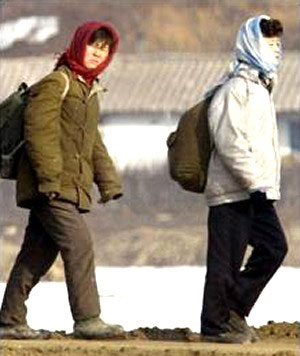White House spokesman Ari Fleischer said
the threat is part of a series of statements from Pyongyang, “all of which
only serve to hurt, isolate and move North Korea backward.” He said the
standoff remains a matter for the international community.
Fleischer
said the U.S. “reacts somewhat judiciously to the statements North Korea
makes. There’s a history of bravado in some of their statements.”
INCREASED TENSIONS POSSIBLE
Even
if Tuesday’s announcement is largely symbolic, any change in the armistice
— the only existing legal instrument keeping an uneasy peace on the peninsula
— could greatly increase tensions and uncertainty.
The
1950-53 Korean War ended with an armistice, not a peace treaty, leaving
the peninsula still technically in a state of war. The frontier is the
world’s most heavily armed with most of the nearly 2 million troops of
both sides deployed near the border, including 37,000 Americans stationed
in the South.
The threat was the latest North Korean
move in an international dispute over its suspected nuclear weapons development.
Recent
decisions by North Korea to restart its nuclear facilities and withdraw
from the Nuclear Nonproliferation Treaty have been widely viewed as attempts
to increase tension and pressure Washington into direct negotiations on
a nonaggression pact. But Washington has remained firm in its assertion
that negotiations are the responsibility of all nations in the region —
specifically Japan, China and Russia.
The
impoverished North, desperate for food and energy aid, has long been undermining
the armistice, calling it a “useless scrap of paper.” It has refused to
participate in armistice commission talks.
Also
Tuesday, China received North Korea’s foreign minister for a brief visit
that Chinese officials said ended with both sides expressing hope that
the nuclear standoff can be resolved peacefully.
Paek
Nam Sun met with China’s vice foreign minister, Wang Yi. Paek was passing
through Beijing en route to a meeting of nonaligned nations in Kuala Lumpur,
Malaysia, according to Foreign Ministry spokeswoman Zhang Qiyue.
“The
two sides expressed wishes to solve this problem on the Korean Peninsula
through dialogue,” Zhang said.
Maj.
Ha Ju-yeon, a spokesman at the South Korean Defense Ministry, said there
were no unusual movements by North Korean troops on Tuesday along the 150-mile
border.
The
winter training for both Korean militaries began in December. But North
Korea suffers acute fuel shortages, and its military’s winter maneuverings
have been less vigorous in recent years, Ha said.
‘NO RISK OF WAR’
“I
think there is little or no risk of war on the Korean Peninsula,” South
Korean President Kim Dae-jung was quoted as saying by his spokeswoman,
Park Sun-sook.
Kim
called for direct dialogue between the United States and North Korea, saying
such talks were crucial to international efforts to bring a diplomatic
end to the dispute.
The U.S. military announced on Monday that it would conduct two joint military
exercises with South Korea next month, although it said the annual maneuvers
are not related to the nuclear dispute with North Korea.
North
Korea has denounced past joint U.S.-South Korea maneuvers as preparations
for an invasion.
The
North Korean threat was issued Monday by the spokesman of the North Korean
military’s mission to Panmunjom, a truce village where the American-led
U.N. Command and the North Korean military meet to oversee the armistice.
KCNA did not release the statement until Tuesday morning.
The
U.N. Command, which supervises the southern half of the Demilitarized Zone
between the two Koreas, had no immediate comment on the North Korean statement.
The
North Korean spokesman also protested the brief interception of a North
Korean cargo ship carrying Scud missiles to Yemen in December, and accused
the United States of planning a naval blockade.
“If the U.S. side continues violating and misusing the armistice agreement
as it pleases, there will be no need for the (North) to remain bound to
the armistice agreement uncomfortably,” the spokesman said.
Last
week, the U.N. International Atomic Energy Agency referred the North Korean
nuclear issue to the U.N. Security Council. The council could consider
economic sanctions against North Korea. The North has said it would consider
any sanctions to be a declaration of war.
The
nuclear standoff began in October when U.S. officials said North Korea
admitted having a covert nuclear program. Washington and its allies suspended
fuel shipments, and the North retaliated by expelling U.N. monitors, taking
steps to restart frozen nuclear facilities and withdrawing from the Nuclear
Nonproliferation Treaty.

|
